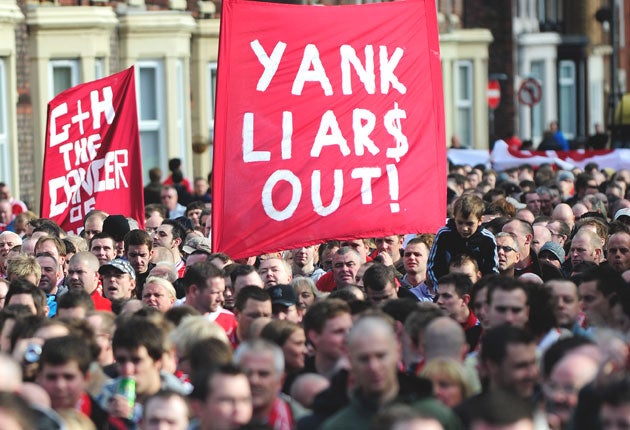Ian Herbert: The £100m question Liverpool can't ignore
The owners' initial plan has left a proud club deep in the red. How did it all go so wrong in less than three years?

Rarely in Liverpool's tortured recent history has quite such a torrent of detail emerged about the Anfield corridors of power in the course of one day. The Spirit of Shankly organisation, who have lived up to their name in these tough past few years for their club, were keen to publish a detailed, six-page minute of their recent meeting with the club's managing director Christian Purslow and when he refused to sign up to it, they published theirs and his side-by-side instead. There were understandable differences in emphasis: any MD would be reluctant to see comments about his club's owners which SoS credit him with. But no one is disagreeing about the significant point. Liverpool need £100m in a hurry and if they don't get it soon that will be the start of the endgame for Tom Hicks and George Gillett.
For Gillett, it will not be before time. He, rather than Hicks, was willing to sit down with Dubai International Capital when they arrived with a £500m bid for a majority share a few years back. At that time, it was clear that the Americans' big plan for Liverpool had backfired. That plan, very roughly speaking, was: buy the club for £300m, build a stadium for £200m and sell it for £800m. A classic deal from one of the world's best leveraged buy-out operators (Hicks) and a shrewd businessman (Gillett).
But the Americans prevaricated on the new stadium plans. By the time they had made a decision on them the price of steel went north and then the credit markets on which their whole leveraged buy-out was so heavily dependant, headed in the opposite direction. The club was listing hopelessly when Purslow, a former merchant banker and minor Liverpool shareholder arrived at the helm last year, to undertake Royal Bank of Scotland's demands for an "equity rise" – the securing of £100m to alleviate the £237m debt heaped upon the club by the Americans.
Purslow has had his detractors but that is largely because he belongs to the new fraternity of individuals who have brought a commercial edge to football's traditional ways. Those who have worked with him on attempts to commercialise this once great club cannot be more effusive in their praise. But Purslow, who revealed yesterday that he advised the North Wales building entrepreneur Steve Morgan on his attempt to buy Liverpool three years before the Americans came on board, knows too well what his main task is. To find would-be shareholders in Liverpool, whose £100m would pay down a large chunk of debt and send the club and their owners into a new, promised land.
What a land that seems to be. Purslow has assurances that if the figure can be brought down by £100m, the debt payments can be rescheduled over three to four years and that, critically, the club's main banker, RBS, would also provide backing to unlock the new stadium which is so crucial to Liverpool's financial destiny.
If. It is a word which occurs fully a dozen times in Purslow's own account of what he told SoS on 21 January, though even the Hicks camp now acknowledges that finding high-net-worth investors who are willing to invest huge sums and then work with the two Americans – one of them truculent and unpredictable at the best of times – will be difficult. If Hicks (the unpredictable one) and Gillett once believed they could expect new minority equity partners who would allow them still to call the shots, then they know the reality now.
It means Purslow must, in tough economic times, find investors with the money to take a majority share at a time when the club are removed from the elite European competition for this season and quite possibly the next. There are some among the fan base who maintain that failure to hit the top four this season would be for the best, finally flushing out of Liverpool two proprietors who need Champions League football to meet their interest repayments. But who might the new owner be, with the club for sale at a knock-down price? And what would they invest? Whichever road Liverpool take it looks to be a rocky one.
Anfield angst: The Americans' time in charge
6 February 2007 Liverpool chairman David Moores accepts a bid from Tom Hicks and George Gillett valuing the club at £218.9m
23 November 2007 The relationship between manager Rafa Benitez and the club's new owners deteriorates over the transfer policy for the January transfer window, in which they initially told Benitez that he could not buy Javier Mascherano.
22 January 2008 Fans protest during a League match against Aston Villa, urging the pair to sell their shares after Hicks admits to holding secret talks with Jürgen Klinsmann to replace Benitez as manager.
June 2009 Chief executive Rick Parry leaves after 12 years at the club due to a strained relationship with Hicks, who had previously asked him to resign in April 2008.
December 2009 Benitez again faces frustration in the transfer market after being told he will only be allowed to bring in new players on loan in January due to financial problems.
11 January 2010 Tom Hicks Jr resigns from the board after sending an abusive email to disgruntled fan Stephen Horner, writing: "Blow me, fuck-face. Go to hell."
Subscribe to Independent Premium to bookmark this article
Want to bookmark your favourite articles and stories to read or reference later? Start your Independent Premium subscription today.

Join our commenting forum
Join thought-provoking conversations, follow other Independent readers and see their replies